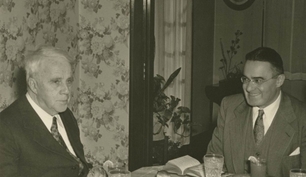| Five year's ago, when my father-in-law passed away, my daughter recited a poem at his funeral. She was then eight years old, but the poem was one she knew well--"Stopping by Woods on a Snowy Evening," by Robert Frost. It was one of my father-in-law's favorite poems and my daughter recited it beautifully, from memory. |
It turns out that Frost had a rather meaningful relationship with a Reform rabbi, and that connection, too, warms me. The University of Buffalo recently announced that they are making public, for the first time, a collection of letters and recordings of Frost that belonged to his close friend, Rabbi Victor E. Reichert. The collection was passed onto Reichert's son, Jonathan Reichert, who is a retired professor of physics at the University.
Frost scholars are eager to look at the collection for hints and clues about Frost's views on religion. His beliefs have been considered a mystery by his biographers, as he neither spoke nor wrote much about them publicly. However, according to Rabbi Reichert, Frost did not have such reticence in speaking privately with him. The two would go for day-long walks with each other through the Vermont woods sharing insights about the Bible, literature and philosophy.
The collection includes a recording of a talk Frost gave at Rockdale Temple, the synagogue that Reichert served for 24 years (and where my friend, Rabbi Sigma Faye "Sissy" Coran, is now the rabbi). In his talk, the poet spoke of how "...[R]eligion always seems to me to come around to something beyond wisdom. It is the straining of the spirit forward to a wisdom beyond wisdom." Those are the words of a man who knew what it meant to struggle with faith and to struggle to know what faith can teach.
I shouldn't quibble with the scholars who have studied Frost's poetry and life much more closely than I have. I shouldn't say, "I told you so," to people who still consider Frost's religious beliefs to be a mystery. But I will say this: The man who wrote, "The woods are lovely, dark and deep. / But I have promises to keep," was a man who knew what it meant to stare into the abyss of unknowing and to emerge with the awareness that there is a Truth greater than we dare know.
And, perhaps, there was a Reform rabbi who helped him find those truths, which he put so beautifully into words.
And miles to go before I sleep,
And miles to go before I sleep.


 RSS Feed
RSS Feed
